Discover the true nature of the French diet. Learn how the French approach food and why our love of cuisine actually promotes a healthier lifestyle.
As a French woman and Integrative Nutrition Health Coach, I felt compelled to debunk a few myths about the French way of eating. So let's dive in!
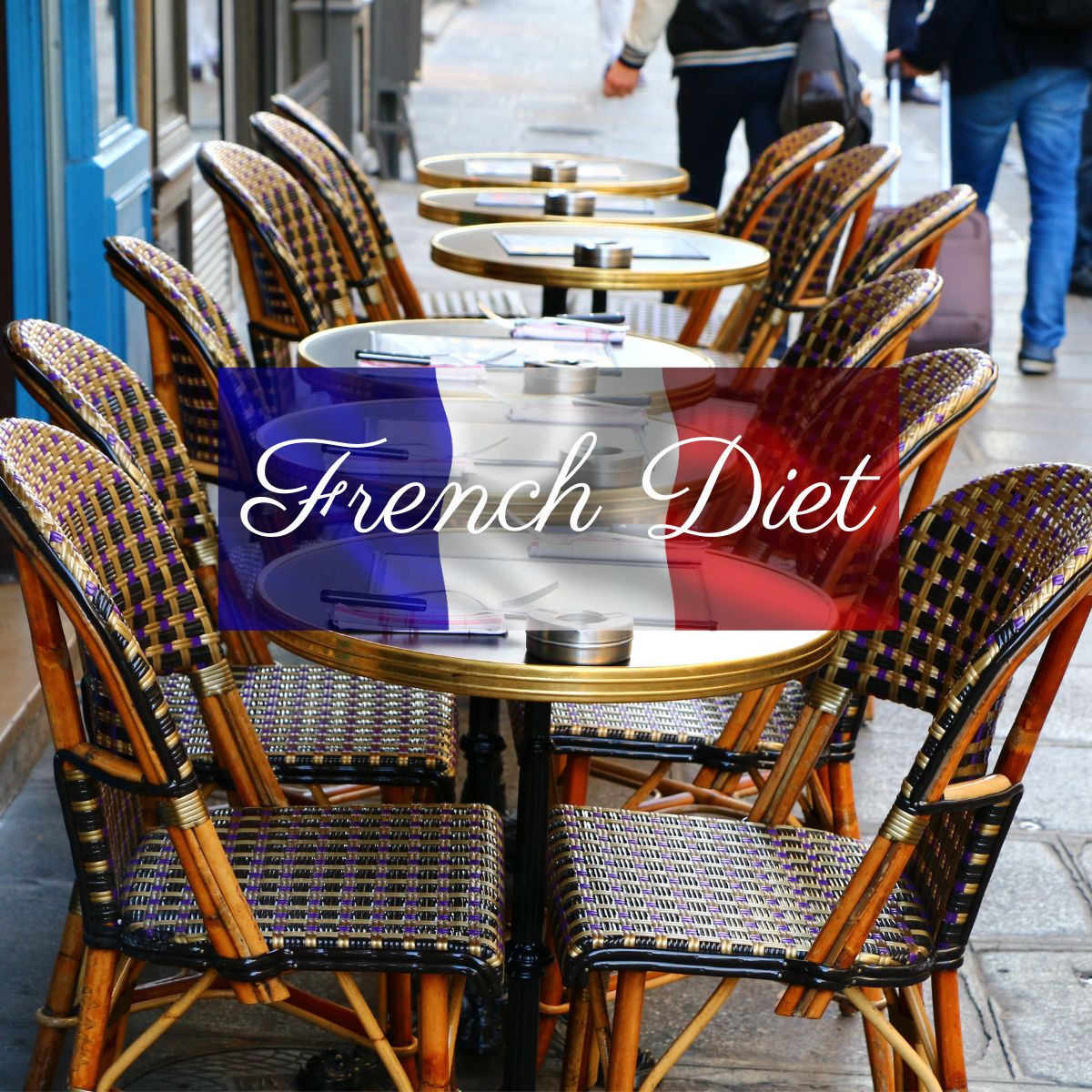
Jump To / Aller directement à
- Focus on Quality over Quantity
- Fresh ingredients
- Home cooked meals
- Sit down for your meals
- Make Time for Meals
- Balance and Moderation
- Red wine but no sodas
- No snacks
- Focus on Ingredient lists over Nutrition Facts
- French people don't meal plan
- French food regulations are watching out for us
- French agriculture
- Walk everyday
- Tips to follow
- Conclusion
- Classic French Recipes
- French Cuisine Made Easy
First of all, a few years ago, as I was in an English book store, I stumbled across the book French Women Don't Get Fat by Mireille Guiliano. Although I haven't read the book, the title in itself made me frown and think "this is so untrue!!!"
More recently, I came across other articles and books about this so-called French diet. And I keep hearing foreigners asking questions about how French people supposedly stay thin and healthy without dieting. So even though I can assure you that the saying that "French people don't diet" is completely false, I do believe that there are some healthy tips to learn from the traditional French Art de vivre.
But before we begin, I insist on the traditional part of things. Because, let's face it, things are changing very quickly. More and more French people don't cook anymore and eat more and more processed foods. And the quality of processed foods in France is plummeting. Consequently, obesity and chronic illnesses are growing very quickly. So here, I'm going to talk about how things are (or were) traditionally done in France, but of course, nothing is set in stone.
Let's explore what's behind the traditional French way of eating and living.
Focus on Quality over Quantity
The French diet values quality over quantity. It prioritizes high-quality foods in smaller portions rather than larger and lower quality portions.
I remember perfectly well that, as I was traveling abroad in 2013, I suddenly realized that the main reason why French cuisine is so highly praised around the world is not because of the recipes. But because of the high quality of the ingredients that we use. You will never see a Michelin star chef use low quality ingredients.
Fresh ingredients
Moreover, in order to create delicious and healthy French meals, it's important to use fresh ingredients. Even better if those ingredients have been produced locally.
The French way of eating focuses on consuming flavorful, fresh whole foods and limiting processed and refined ingredients.
Home cooked meals
Like I've said, things are changing especially since all the lockdowns when many restaurants started deliveries. But up until very recently, most family meals in French homes would be home cooked meals.
Although it sure is nice to sometimes get a takeout so you can just relax and not worry but having to make dinner, cooking at home allows you to control the amount of salt, sugar and fat in your meals, making it easier to maintain a healthy diet.
Sit down for your meals
French people sit down to eat and drink. We don't eat or drink "on the go". Before the arrival of Starbucks and the likes in the early 2000s, nobody would ever walk around in Paris with a cup of coffee. People would be seated at a café, sipping a cup of coffee.
But if you pay close attention, most French people who go to Starbucks will sit there or they will bring their coffee to sit in a park or somewhere else. You will rarely see them walking around while drinking it.
Another important element of the French diet is eating meals at the table as a family. The same goes at work where we will either eat together at the company restaurant (also called cantine) or in the dedicated room in our office buildings not seated at our desk in front of the computer while working.

Make Time for Meals
The French approach to eating emphasizes enjoying every bite and savoring each moment, which can help promote healthier eating habits in the long run.
When we truly appreciate the food we consume, we can feel more satisfied and fulfilled with smaller portions.
French people have a lunch break of about 45 minutes to one hour at work.
Slow down and take the time to savor and appreciate every bite of your meals, rather than wolf it down with no thought. It's not always easy in our fast-paced world, but scheduling breaks throughout the day to eat without distractions like phones or computers can make a big difference.
Taking the time to masticate your food is also extremely important for your gut health and digestion. With this in mind, it's worth making the effort to prioritize mealtime and give our bodies the nourishment they need.
Balance and Moderation
Have you ever marveled at how French people seem to be able to indulge in rich, buttery croissants and cheese without packing on the pounds? Well, we don't overindulge.
Another key aspect of the French approach to eating is embracing balance and moderation. Instead of eliminating entire food groups or drastically reducing calorie intake, the French prioritize taste and enjoyment while finding a healthy balance in their diets. From time to time we enjoy rich foods like croissants and patisseries, but we balance it out with plenty of fresh fruits and vegetables.
Croissants are only eaten on special occasion breakfasts. Absolutely NOT on a daily basis. Same with cakes and other patisseries which are mostly eaten for Sunday lunch desserts. On a regular weekday, desserts will be yogurt or a piece of cheese and/or a piece of fruit.
Red wine but no sodas
Most French people stick to water and maybe a glass of wine with their meals but they don't drink sodas. Sodas and other sugary drinks and cocktails are served at parties or for an occasional "apéritif" (appetizers).
Studies have shown that drinking red wine in moderation has several health benefits.
No snacks
Except for a mid-afternoon snack (the "goûter") which is mainly for kids, French people don't snack. Most of us have 3 real meals a day and don't need to snack in between. And if we are hungry before a meal, we will take a piece of fruit or bread.
Focus on Ingredient lists over Nutrition Facts
French dishes are traditionally made with fresh, whole ingredients and emphasize flavor and texture over calorie counting.
If you've read my article on Gut health and weight loss, you know that my dad is an ingredient expert and that he taught me at a very young age to check packaged food ingredients.
One of the things that impressed me on the first time I ever traveled to the US was how hard it was to find the ingredient list on most packaged foods. On the other hand, it was extremely easy to find the Nutrition facts. In France, most of the time, the ingredient list is easy to find on the package and the nutrition facts are not as highlighted as on American packages.
That's also something that I've experienced as a food blogger. Ever since I became a food blogger I've got some questions about the nutrition facts of my recipes from my English speaking audience, whereas, I've yet to receive any questions about nutrition facts from my French speaking audience. Please note that I'm not judging anyone here, I'm simply stating a fact.
So I think French people tend to be more focused on the ingredient list (whether or not they know the ingredients and if they are primary ingredients) than on counting calories or protein intake or by wondering if something is low-fat or high-fat.
Our knowledge of food comes from our family traditions - what our parents and grandparents ate and taught us - rather than from media reports. Which is also a problem now, because many French people refuse to hear about the benefits of a gluten free or dairy free diet for some people.
French people don't meal plan
I know, you're probably going to hate me for saying this but meal planning is not in our culture.
When French people do their grocery shopping, they tend to buy what is currently being promoted by the farmer's market or the butcher's suggestion of the day. We tend to decide what to cook while we are at the farmer's market. A little bit like French chefs who will create their menu according to what their suppliers will provide them each day depending on the season and fresh product deliveries.
Another reason for this no meal planning, according to me, is that we embrace pleasure in food. We tend to eat what we feel like eating on that day and we don't know what we're going to want to eat 4 days from now.
French food regulations are watching out for us
Although French food regulations are often criticized by French people (including me), whenever I travel, even in other European countries, I'm appalled by the ingredients contained in some processed foods.
So yes, I believe that we are very lucky in that regard. When you buy a bag of chips in France compared to a bag of chips in the US: OMG!! The ingredient list on a regular bag of chips in the US is extremely scary. It looks more like a checklist of chemicals for a lab experiment than anything close to food. When there should be only 3 ingredients: potatoes, oil and salt.
So if you live in a country where the Food Administration is not doing a great job at protecting you, you have to take matters into your own hands. I encourage you to read my article The truth about Aroy-D coconut milk ingredients to find out more about this topic.
French agriculture
Again, even though, French agriculture is far from perfect and has some progress to make, all in all, it is quite good.
We have less pesticides and GMOs than in some countries. And I keep hearing from some of my American readers that when they travel to France they feel less bloated when they eat certain foods than when they eat those foods back home.
Walk everyday

French people who live in big cities especially Parisians, walk a lot. Not exactly because they love it, but because it's how things work here. Many Parisians (like me) don't own a car because we don't need it. We walk to the grocery shop or to the bakery, etc. Even when we take the subway or the bus to go to work or anywhere else, we have to walk to the station, up and down the stairs...
And of course, we also enjoy walking for pleasure. On Sundays, after a family meal, there often is what we call a "promenade digestive" (digestive walk).
Tips to follow
To incorporate the French diet into your lifestyle you can try these tips:
- Start by focusing on the quality of your food rather than the quantity.
- Shop at local farmers markets or specialty food stores to find the best ingredients for your dishes.
- Choose fresh, whole foods that are minimally processed and make sure to include plenty of fruits and vegetables in your meals.
- Try having a proper lunch break into your daily routine when you will sit down and take your time to eat.
- Take the time to truly savor your food and listen to your body's hunger and fullness signals. This can help you avoid overeating and make more conscious choices about what and how much you eat.
- Embrace balance and moderation.
- Finally, don't forget to enjoy, from time to time, a glass of red wine in moderation with your meals.
- Try to walk everyday.
Conclusion
In conclusion, the French diet is more than just a collection of delicious and indulgent foods. It's a way of life that prioritizes pleasure, balance and mindfulness. Remember, it's not just what you eat but how you eat that counts.
As the French adage says: “We must eat to live and not live to eat” (in French: "Il faut manger pour vivre et non pas vivre pour manger") meaning: don’t give into excess.
To truly embrace the French approach, why not experiment with some French recipes?
Now, let's move on to some tasty recipes to try!
Classic French Recipes
See more French Recipes →
FREE EMAIL BONUS
French Cuisine Made Easy
Learn easy and simple recipes that will transport your taste buds to the streets of Paris without compromising your health goals.
Did you like this article? Please leave a review below! Also, let's stay connected on social media! You can find me on Instagram, Facebook and Pinterest.


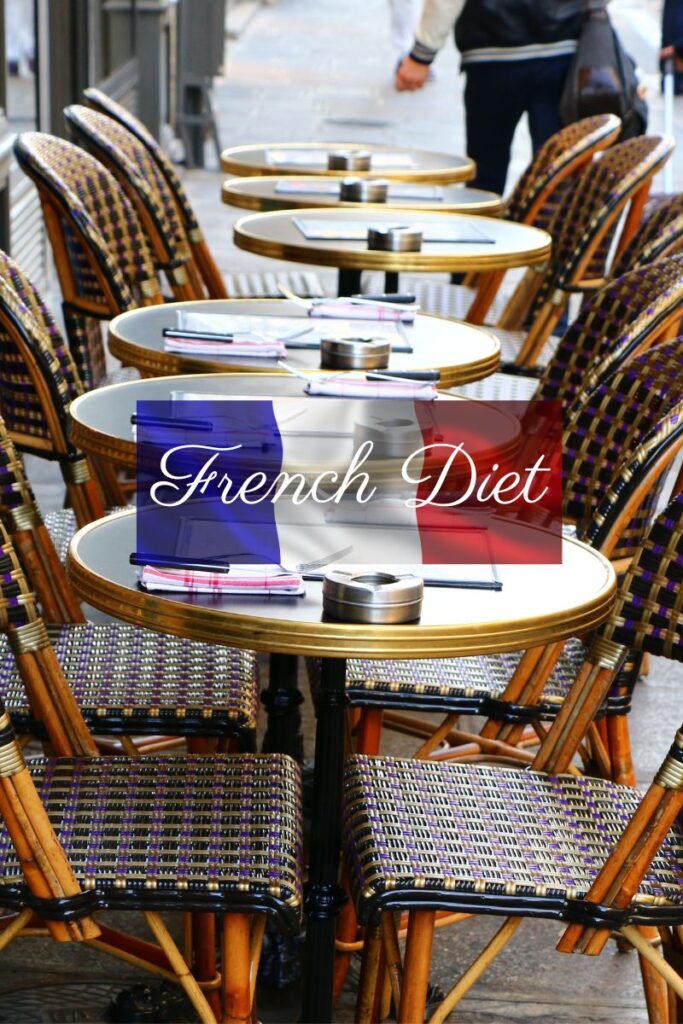
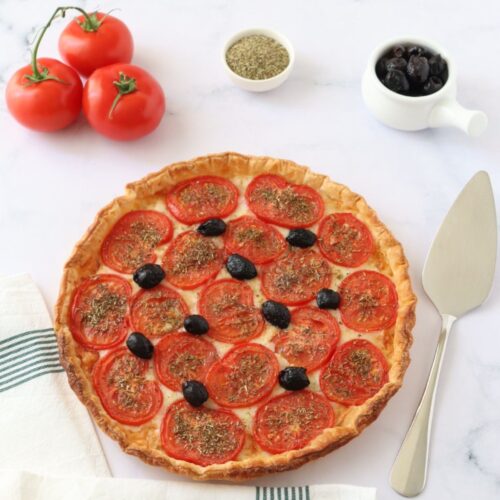
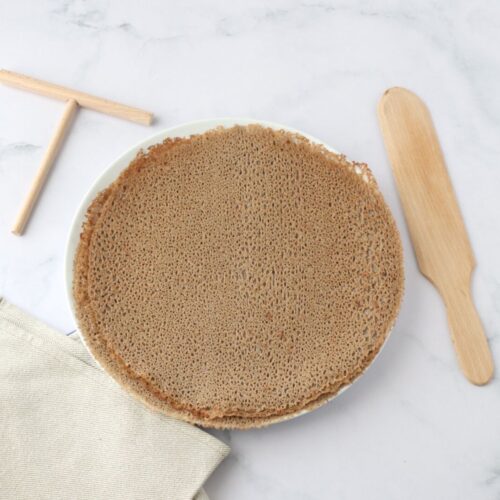

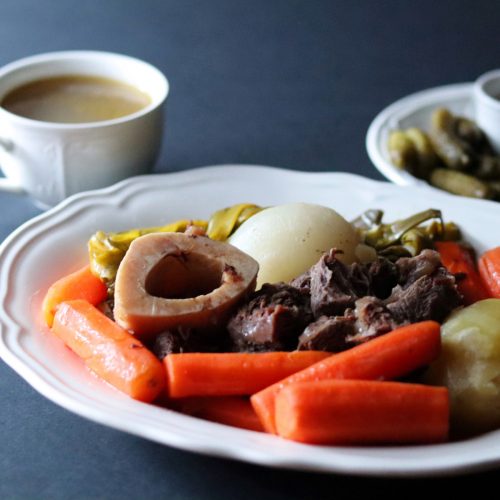




Claire
Salut Bea
I agree that the French are now eating more processed foods at home however, eating out, what strikes me is the moderate approach certainly many restaurants in Paris take. Instead of insisting on stuffing you (as an act of hospitality, which is non-negotiable in parts of the UK!) restaurants in Paris take care to ask whether you would like just one ball of ice cream. It is far easier to eat well here.
Bea C.
Salut Claire. Thank you for your insight and for taking the time to write a comment! So interesting to hear about how things are done in other countries. Unfortunately I haven't yet traveled much around the UK (though it is on my bucket list).
Chantal
Dear Bea,
I agree with your assessment about the French way of life. I was born and raised in France and moved to California 40 years ago. In spite of living longer in the US than in France at this time of my life, I have kept the French approach to food. I prepare my meals from scratch, I shop at the farmers' market. The fruits and vegetables are more expensive but taste much better. Quality over quantity. I seat at the table when I eat.
At home, I have become mostly vegetarian, but when I travel, I tend to eat out and taste the local cuisine. For example, during my last trip to Mexico, I only had breakfast and a light dinner at "home", but went to a restaurant for lunch where I indulged eating the delicious seafood dishes. At home I rarely eat a sweet desert such a cake or ice cream, but in Mexico, I went for ice cream three times during the 5 days I stayed there!
Bea C.
Bonjour Chantal. Thank you so much for taking the time to comment on my article on the French diet. I'm glad to hear that you agree with me as it was not an easy article to write. I'm used to this way of living so it was hard to take a step back and try to see things with a different eye.